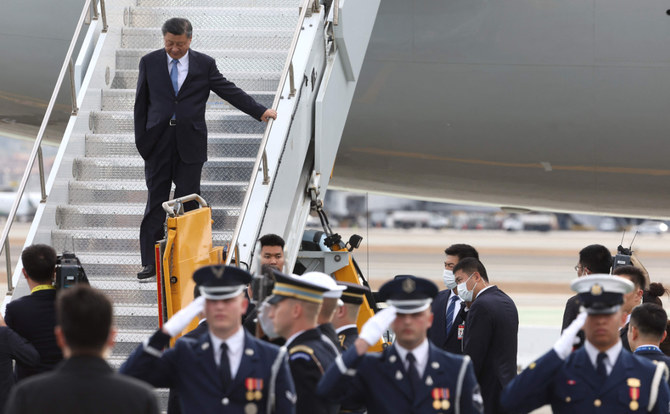SAN FRANCISCO: US Secretary of State Antony Blinken took a thinly veiled swipe at China on Tuesday on the eve of an Asia Pacific Economic Cooperation (APEC) forum summit and the first face-to-face meeting between the US and Chinese leaders in a year.
Addressing a ministerial meeting of the 21-member APEC in San Francisco just before Chinese President Xi Jinping’s arrival in the city, Blinken stressed the US believed in “a region where economies are free to choose their own path ... where goods, ideas, people, flow lawfully and freely.”
Xi is on his first visit to the US since 2017. He is due to meet US President Joe Biden at an undisclosed location in the San Francisco Bay Area on Wednesday morning and then attend the APEC summit.
The Biden-Xi meeting will be only their second in person since the US president’s inauguration in 2021 and has been billed by US officials as an opportunity to reduce friction in what many see as the world’s most dangerous rivalry.
Blinken did not mention China in his remarks, but his language echoed US rhetoric in recent years in which Washington has accused China of bullying smaller countries in the Indo-Pacific and trying to undermine what the US and its allies call the existing “rules-based” order.
US Trade Representative Katherine Tai, who with Blinken opened the APEC ministerial session, said the San Francisco meeting came at a time of “great uncertainty and challenges” for the region. She noted increasing geopolitical tensions, fragile supply chains and a worsening climate crisis.
Earlier, Biden said his goal in his talks with Xi would be to improve the relationship with China after a period of strained ties. He said he would seek to resume normal communications between the two superpowers, including military-to-military contacts.
White House national security spokesperson John Kirby told reporters Biden and Xi would also talk about the Israel-Hamas conflict in Gaza as well as US efforts to support Ukraine in its battle to repel Russian invaders.
Economic issues will be high on the agenda.
Biden said the US does not want to decouple from China but wants to change the economic relationship for the better.
His administration has made a push to “de-risk” some critical US supply chains from China as the two countries’ economic and military rivalry has grown.
But it has been careful to assure countries in the region, including China, that the US does not seek complete economic separation, a notion that has fueled concerns among Washington’s partners and allies of a superpower showdown that would upend the global economy.
The Chinese severed military-to-military contacts with the US after then-House of Representative Speaker Nancy Pelosi visited democratically governed but Chinese-claimed Taiwan in August 2022.
Restoring the contacts is a top US goal to avoid miscalculations between the two militaries.
Relations between the two countries grew particularly frosty after Biden ordered the shooting down in February of a suspected Chinese spy balloon that flew over the United States.
Top Biden administration officials have since visited Beijing and met with their counterparts in an effort to rebuild communications and trust.
Several hundred mostly pro-China demonstrators carrying Chinese flags gathered outside the Chinese delegation’s hotel ahead of Xi’s arrival in the US
Larger protests, including by rights groups critical of Xi’s policies in Tibet, Hong Kong and toward Muslim Uyghurs, are expected to gather near the summit venue on Wednesday.
As Biden arrived in San Francisco, shortly before Xi was due to land, dueling demonstrators greeted the US president’s motorcade from the airport. Some waved Chinese flags and held banners calling for “kindly” and “warm” US-Sino ties. Others held signs condemning the Chinese Communist Party (CCP).
Earlier on Tuesday, a small aircraft flew circles over the APEC summit venue, trailing a banner that read “END CCP FREE CHINA FREE HK FREE TIBET FREE UIGHUR,” referring to China’s treatment of Uyghurs, which the Biden administration calls “genocide.”














